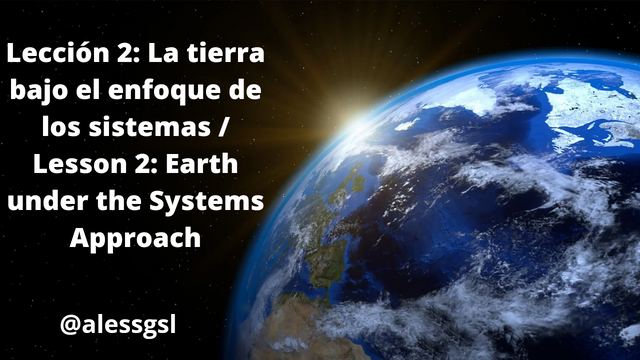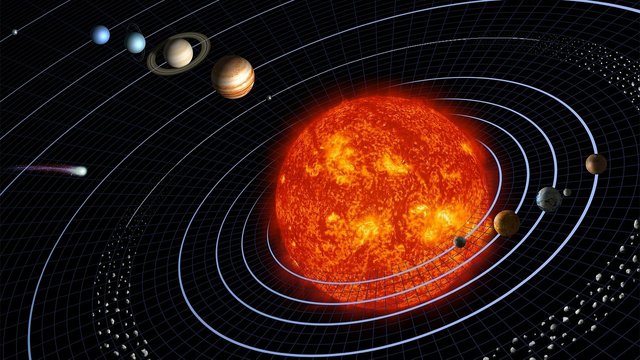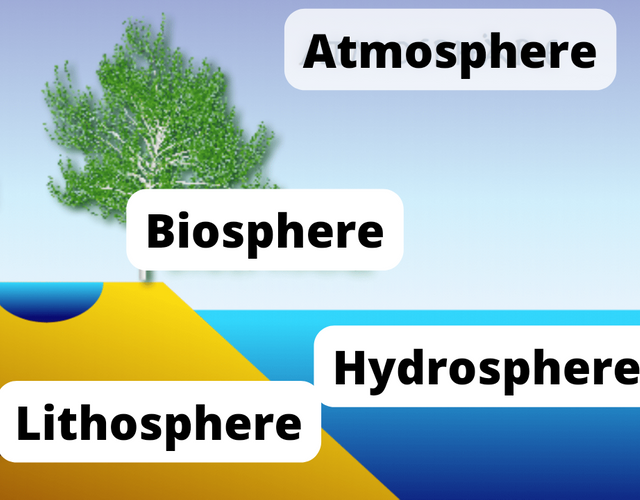Lección 2: La tierra bajo el enfoque de los sistemas / Lesson 2: Earth under the Systems Approach
Es un placer estar aquí como tutora. Espero que las clases sean de su agrado y puedan aprender mucho más sobre nuestro hogar, el Planeta Tierra.
Para esta ocasión, el tema corresponde a la Tierra bajo el enfoque de los sistemas.


¿Qué es un sistema?
La palabra "sistema" muchas veces la hemos escuchado o leído, por ejemplo cuando hablamos del sistema educativo, sistema solar y sistema nervioso. ¿Pero que significa esta palabra?
Sistema es un conjunto de elementos que se relacionan entre sí, de manera equilibrada y estructurada, para alcanzar una meta u objetivo.

Características de los sistemas
Para que un conjunto de elementos se consideren como un sistema, deben poseer las siguientes características:
1. Ámbito: Es el espacio en el que se localiza el sistema.
2. Estructura: Todos los elementos que conforman el sistema estan relacionados, respetando un orden lógico.
3. Intercambio: Entre los elementos y el ámbito existen intercambios. Esto se conoce como "La dinámica del sistema".
4. Equilibrio: Los sistemas generalmente se adaptan a cualquier entorno o ambiente que pueda afectar su comportamiento. De esta manera, se mantiene una estabilidad entre los elementos.
5. Evolución: Dado a que los sistemas se adaptan y equilibran sucesivamente, pueden evolucionar.
¿El planeta Tierra es un sistema?
Si tomamos en cuenta el significado de la palabra "Sistema", entonces la respuesta es: ¡Si! El planeta Tierra es un sistema.
✔ Posee un ámbito: La Tierra se encuentra en otro sistema denominado "Sistema Solar", que tiene como fuente de energía el Sol.

✔ Tiene una dinámica: La Tierra como todo sistema, tiene una interacción con lo demás elementos. Por ejemplo: radiación solar e interacciones gravitatorias. Además, dentro del planeta, existe una interacción entre las geóferas. Toda esta dinámica tiene un objetivo y es la existencia de la vida en el planeta.
✔ Posee una estructura: La Tierra esta conformada por un conjunto de elementos denominados geósferas: atmósfera, listósfera, hidrósfera y biósfera. Todas ellas corresponden a la estructura del planeta y se encuentran en intercambio continuo de energía y materia.

✔ Se encuentra en evolución: El planeta siempre se encuentra en constante cambio o evolución, cuyos componentes se relacionan en procesos cíclicos naturales.
Importancia del enfoque de los sistemas
El enfoque de los sistemas es muy importante en las Ciencias de la Tierra, porque el planeta se debe estudiar de manera integral, considerando sus elementos, equilibrio, interacciones y su evolución en el transcurso del tiempo.
Por otro lado, el enfoque de sistema, es una gran herramienta para entender mejor nuestro mundo, porque es muy complejo. Por ejemplo: Si se dan cuenta, el planeta es un sistema, pero él también forma parte del Sistema Solar. Además, el Sistema Solar es un elemento de un sistema mucho mayor conocido como "El espacio".

Cabe destacar, que el estudiar el planeta como un "Todo", permitirá comprender que al ser un sistema también es vulnerable ante las actividades del hombre. Por ello es esencial evitar la contaminación del planeta, para mantener el equilibrio y la armonía, y a su vez, asegurar un futuro para las próximas generaciones.


Referencias utilizadas:
✔ Libro físico. Mi planeta Tierra 2. Autor: Prof. Jorge Lösch. Editorial Salesiana.
✔ Libro físico. Ciencias de la Tierra 5to año. Autores: Daniel Requeijo y Alicia de Requeijo. Editorial Biosfera.

Tarea:
Realiza una publicación donde respondas a lo siguiente:
1.¿Qué es un sistema?
2.¿Cómo se caracterizan los sistemas?
3.¿Por qué el Planeta Tierra es un sistema?
4.¿Por qué se estudia el planeta bajo el enfoque de sistema?

Reglas para realizar tu publicación
1. Realiza tu publicación en la comunidad Steem kids y deja el link en los comentarios de esta publicación.
2. Haz resteem a esta publicación para que llegue a más usuarios.
3. Tu contenido debe ser original. Si utilizas imágenes o información de otros autores, asegurate de colocar las fuentes correctamente.
4. Debes pertener a algún club: club5050, club75 o club100.
5. Debes estar verificado en la comunidad.
6. Tu publicación debe contener mínimo 300 palabras y el uso de la etiqueta steemexclusive y la del club. Te recomiendo utilizar la etiqueta learnwithsteem.
7. Las tareas se aceptarán hasta el vencimiento de esta publicación.

Esta publicación esta configurada para aportar el 10% de las recompensas a la cuenta comunitaria @steemkidss.
Si quieren conocerme pueden visitar el siguiente enlace correspondiente al Logro 1

It's a pleasure to be here as a tutor. I hope that the classes are to your liking and that you can learn much more about our home, Planet Earth.
For this occasion, the theme corresponds to the Earth under the systems approach.


What is a system?
We have heard or read the word "system" many times, for example when we talk about the educational system, the solar system and the nervous system. But what does this word mean?
System is a set of elements that are related to each other, in a balanced and structured way, to achieve a goal or objective.

Characteristics of the systems
For a set of elements to be considered as a system, they must have the following characteristics:
1. Scope: Is the space in which the system is located.
2. Structure: All the elements that make up the system are related, respecting a logical order.
3. Exchange: Between the elements and the scope there are exchanges. This is known as "System Dynamics".
4. Balance: Systems generally adapt to any setting or environment that may affect their behavior. In this way, stability between the elements is maintained.
5. Evolution: Since systems successively adapt and balance, they can evolve.
Is the planet Earth a system?
If we take into account the meaning of the word "System", then the answer is: Yes! Planet Earth is a system.
✔ It has a scope: The Earth is in another system called "Solar System", which has the Sun as its source of energy.

Solar System. Source

Geospheres of the planet. Image edited in Canva. Source

Major System (The Universe). Source

Source
Thank you very much for your support and feedback!
CC: @ngoenyi

✔ It has a dynamic: The Earth, like any system, has an interaction with the other elements. For example: solar radiation and gravitational interactions. In addition, within the planet, there is an interaction between the geospheres. All this dynamic has a goal and that is the existence of life on the planet.
✔ It has a structure: The Earth is made up of a set of elements called geospheres: atmosphere, lithosphere, hydrosphere and biosphere. All of them correspond to the structure of the planet and are in continuous exchange of energy and matter.

✔ It is in evolution: The planet is always in constant change or evolution, whose components are related in natural cyclical processes.
Importance of the systems approach
The systems approach is very important in Earth Sciences, because the planet must be studied in an integral way, considering its elements, balance, interactions and its evolution in time passage of time.
On the other hand, the system approach is a great tool to better understand our world, because it is very complex. For example: If you realize, the planet is a system, but it is also part of the Solar System. Furthermore, the Solar System is one element of a much larger system known as "Space".

It should be noted that studying the planet as a "whole" will allow us to understand that, being a system, it is also vulnerable to human activities. For this reason, it is essential to avoid contaminating the planet, to maintain balance and harmony, and in turn, ensure a future for future generations.


References used:
✔ Physical book. Mi Planeta Tierra 2. Author: Prof. Jorge Lösch. Editorial Salesiana
✔ Physical book. Ciencias de la Tierra 5. Authors: Daniel Requeijo and Alicia de Requeijo. Editorial Biosfera.

Task:
Make a post responding to the following:
1.What is a system?
2.How are systems characterized?
3.Why is Planet Earth a system?
4.Why is the planet studied under the system approach?

Rules for making your publication
1. Make your post in the Steem kids community and leave the link in the comments of this post.
2. Please resteem this post to reach more users.
3. Your content must be original. If you use images or information from other authors, make sure to place the sources correctly.
4. You must belong to a club: club5050, club75 or club100.
5. You must be verified in the community.
6. Your publication must contain a minimum of 300 words and the use of the steemexclusive tag and the club tag. I recommend using the learnwithsteem tag.
7. Assignments will be accepted until the expiration of this post.

This post is set to contribute 10% of rewards to the @steemkidss community account.
If you want to know me you can visit the following link corresponding to Achievement 1
Hola Ale, está genial tu tutorial, muy educativo hasta para los más grandes, espero los niños disfruten de estas lecciones y realicen las tareas 🤗
Hola @yannellys-32, muchas gracias por tus palabras y buenos deseos 🙏 me alegra que te haya gustado esta lección, saludos!!
Feliz noche. Que maravilla de lección para educar a los niños y todos los steemians en general. Una explicación detallada pero comprensible.
Te felicito y deseo muchos éxitos. 👍
Muchas gracias por tus palabras 😃 me alegra mucho que te haya gustado esta clase!! Bendiciones
Wonderful lesson as always. Thanks for the explanations you have given to the planet earth. I have also benefited.
Thank you very much for your beautiful words! I am very glad that you liked the lesson. 😃
Thank you for contributing to #LearnWithSteem theme. This post has been upvoted by @Reminiscence01 using @steemcurator09 account. We encourage you to keep publishing quality and original content in the Steemit ecosystem to earn support for your content.
Regards,
Team #Sevengers
Thanks for the support!!
Excelente contenido para todos los steemians. Es muy fácil de comprender a través de tus tareas. Saludos y bendiciones.🙏
Muchas gracias ❤ me alegra que te haya gustado. Bendiciones igualmente 😃🙏
Congratulations, your post has been upvoted by @scilwa, which is a curating account for @R2cornell's Discord Community. We can also be found on our hive community & peakd as well as on my Discord Server
Felicitaciones, su publication ha sido votado por @scilwa. También puedo ser encontrado en nuestra comunidad de colmena y Peakd así como en mi servidor de discordia
Muchas gracias por el apoyo!!
Que buen trabajo en tu lección, aprendí muchísimo y recordé conceptos que había dejado en el pasado. Muy buena clase, el Planeta Tierra tiene tanto por conocer, los sistemas, elementos, todo es increíble.
Éxitos!
Muchas gracias Carlita!! Me alegra mucho que te haya gustado y aprendido 😃 así es, todavía hay mucho que conocer sobre el planeta y el universo.
Excelente trabajo educativo, sencillo, básico y claro. Te deseo muchos éxitos. ¡Dios te bendiga!
Muchas gracias ❤ Me alegro que te haya gustado!! Bendiciones igualmente!!
Ahora podemos aprender del planeta con una gran tutora como tu. Que buena lección Alessandra, te felicito porque estas dando un gran paso en la enseñanza y avance de la plataforma. Éxitos y a tus niños también 😀❤
Muchas gracias por tus hermosas palabras @arcayart!! ❤ Dios te bendiga siempre!!